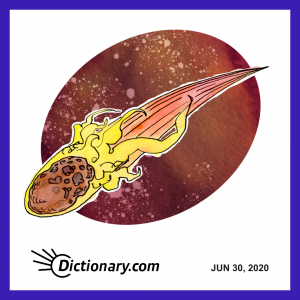Word of the Day
staycation
noun
a vacation spent at home or near home, doing enjoyable activities or visiting local attractions.
More about staycation
Staycation, a portmanteau word, as Lewis Carroll would call it, formed from stay and vacation, is associated with the Great Recession of 2007–09. Actually, staycation is considerably older: It was originally an Americanism, and it first appeared in print in 1944, in the middle of World War II, when gasoline and automobile tires (among much else) were strictly rationed.
how is staycation used?
Washington’s hospitality and tourism industry … will be ready to accommodate Seattleites and Washingtonians, because everyone expects this will be the summer of the staycation.
As relatively new residents of Philadelphia, we’re planning a staycation in our new hometown. We’ll finally plow through our lengthy backlist of streaming movies and shows.
staycation


bolide
noun
Astronomy.
a large, brilliant meteor, especially one that explodes; fireball.
More about bolide
A bolide is a large, brilliant meteor that explodes before hitting the earth. The term comes from French, from Latin bolis (inflectional stem bolid-) “meteor,” from Greek bolís (stem bolíd-) “missile, javelin, flash of lightning, throw of a pair of dice.” The Latin sense “meteor” is first recorded by the Roman naturalist and encyclopedist Pliny the Elder in the first century a.d., perhaps from a resemblance between a fireball in the sky and a flash of lightning. Bolide entered English in the mid-19th century.

how is bolide used?
At exactly fourteen minutes after eight … the bolide passed overhead. It was an amazing spectacle. It left a trail of flame behind, across thirty degrees of sky.
A meteor that explodes in mid-air before it hits the ground is known as a bolide. It’s thought that the high-pressure air in front of the falling meteor seeps into cracks in the rock, increasing internal pressure and causing the rock to break apart.
bolide


anchorite
noun
a person who has retired to a solitary place for a life of religious seclusion; hermit.
More about anchorite
The English noun anchorite “hermit” comes from Middle English anchorite, anachorite, ancorite, from Old French anacorittes and Medieval Latin anachōrīta, equivalent to Late Latin anachōrēta “a hermit, eremite, recluse, ascetic,” from Late Greek anachōrētḗs “one who has retired from the world,” a derivative of anachōreîn “to withdraw, retire.” Anachōreîn is a compound of the adverb and preposition aná and prefix ana– “up, back, re-“ and chōreîn “to make room for, withdraw, give way,” a verb derived from chôros “piece of ground, space, place.” Anchorite entered English in the 15th century.
how is anchorite used?
I am most gratified to find that you are among those who indulge in a legitimate enjoyment of the good things of life. I am sure that if God intended us to be anchorites he would have fashioned this world after another sort.
We’re all lonely now. We’re all cut off from each other, trapped inside the walls of our own domestic space, the 21st-century version of the medieval anchorite.
anchorite





